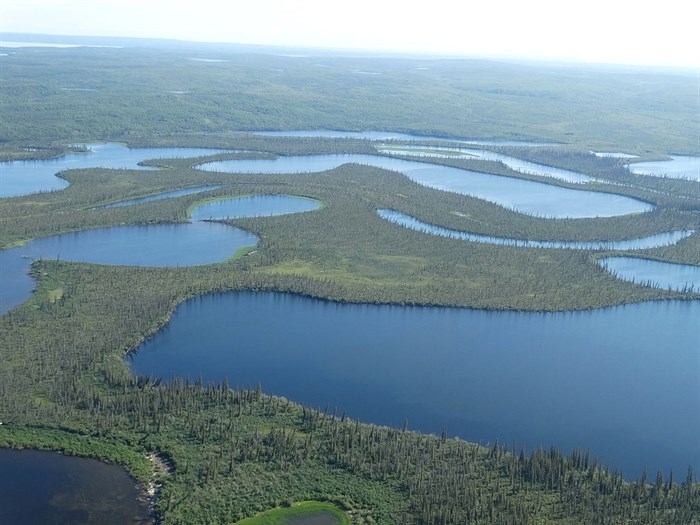
View over Mackenzie Delta.
Image Credit: Adam Jones via Wikimedia Commons
October 15, 2015 - 6:30 PM
VANCOUVER - A new, trans-boundary agreement that commits British Columbia and the Northwest Territories to working together to manage the waters of the Mackenzie River basin shouldn't have a dramatic effect on industry in the region, says B.C.'s environment minister.
Mary Polak was in Vancouver on Thursday alongside her territorial counterpart, Environment and Natural Resources Minister Michael Miltenberger, to sign the British Columbia and Northwest Territories Bilateral Water Management Agreement.
"Over the coming years … you'll see a much more streamlined and much more aggressive approach to managing water resources," said Polak.
She played down any impact the deal may have on resource development in the basin, saying that the announcement gives greater certainty to industry and mostly formalizes what has been in the works "for many, many years."
Before sitting down with Miltenberger to officially sign the deal, Polak referenced what she described as an old saying: "Whisky's for drinking and water's for fighting over."
"But I think we've proven with these agreements that it doesn't have to be that way, that we truly can collaborate."
Miltenberger lauded the accord as the second of its kind, following a similar deal his government signed with Alberta in March, that places an emphasis on the importance of water for the aquatic ecosystem.
"In this case, 85 to 90 per cent of the water is going to stay in the basin to make sure the basin can thrive and survive," he said.
"Usually the water is just carved up by the people and the land and their needs, and the animals come second. In this case, we've hit that balance as we look at sustainably managing the Mackenzie River basin."
A significant component of the agreement will be the creation of bilateral committees involving First Nations representatives that will provide a forum for ongoing discussions on cross-boundary resource management, said Polak.
Lands Director Lana Lowe said members of the Fort Nelson First Nation are pleased with the consultation that has taken place thus far.
"We're really looking forward to playing a meaningful role in implementing this agreement," she said by phone from Fort Nelson.
The Liard and Petitot watersheds — both tributaries of the Mackenzie — run through the heart of Fort Nelson First Nation territory.
The Mackenzie River watershed covers an enormous swath of Canada's Northwest, draining a staggering 1.8-million square kilometres, or nearly 20 per cent of the country's land mass.
It is Canada's longest and largest river, with tributaries that reach into B.C., Alberta, Saskatchewan and Yukon.
In 1997, those four jurisdictions — plus the N.W.T. — established the Mackenzie River Basin Board in recognition of the need to work collaboratively to manage the basin.
B.C. has similar agreements in the works with Alberta and Yukon, which are expected to be completed within the next few months.
Land-use agreements in the region have not been without controversy in recent years.
In early 2014 a coalition of conservationists and First Nations took Yukon's government to court, arguing the territory's decision to open a chunk of Canada's North to mining and development ignored an established land-use plan.
The Yukon Supreme Court ultimately agreed with them, ruling that the territorial government had violated the land-use planning process.
News from © The Canadian Press, 2015